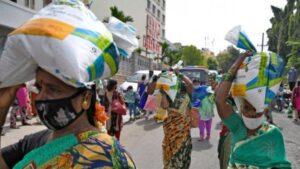
The reckless spending of taxpayers’ money on ‘freebies’ is neither recognised policy/custom nor sanctioned in a court of law. Credit: DH File Photo
Hearing a PIL seeking directions against ‘freebies’ on August 3, the Supreme Court sought suggestions on the composition of a committee that can go into the issue “dispassionately” and make recommendations. It gave a sense that it is for Parliament, besides the Election Commission, to take the initiative to enact a law on curbing freebies.
The Union government’s standards of financial propriety clearly lays down that “no authority shall exercise its powers of sanctioning expenditure to pass an order which will be directly or indirectly to its advantage; and the expenditure from public moneys should not be incurred for the benefit of a particular person or a section of the people unless a claim for the amount could be enforced in a court of law or the expenditure is in pursuance of a recognised policy or custom”.
The reckless spending of taxpayers’ money on ‘freebies’ is neither recognised policy/custom nor sanctioned in a court of law. It is blatant financial irregularity that amounts to bribing voters using public money, solely to gain electoral advantage. An individual candidate distributing cash or liquor (using his own money) to garner votes is treated as a corrupt practice, and rightly so, but a party bribing voters, that too using public money, gets legitimacy (albeit de facto).
Some experts have sought to justify freebies saying that ‘a promise made by a party is a contract with the people’. This is a fallacious argument as redemption of such a promise is inextricably linked to the use of taxpayers’ money. Sans the latter, the former would be meaningless. On the other hand, making a promise not backed by resources (albeit public) is outright misleading.
Unlike ‘normal’ budget expenses, which are planned and backed by efforts to garner revenue, additional financial liabilities imposed by ‘freebies’ promised in the election manifesto affect the budgetary position of the state in an uncontrolled manner. For instance, the AAP’s promise of free power and a Rs 1,000 per month dole to every adult woman in Punjab will dent the state’s budget by Rs 20,000 crore annually. This will be at the cost of development expenditure or result in additional borrowings, pushing debt to unsustainable levels.
Ideally, any welfare measure should be aimed at the poor and that too for a limited period, after which she should stand on her own. But the ‘freebies’ given today defy this cardinal principle.
Unlike a normal welfare scheme, which has a sunset date and ends after the underlying purpose is achieved, the ‘freebies’ offered by political parties have none. This is because such doles are not backed by any well-defined objective; herein the sole aim is to influence voters. Freebies being at the foundation on which victory is secured, the parties concerned are prone to promising them election after election.
The ‘freebies’ culture is changing the mindset of people, making them complacent towards work. This can lead to a scenario whereby India’s demographic dividend would be converted into a demographic liability. In short, ‘freebies’ are a recipe for financial bankruptcy of the states and economic disaster. The only way to avoid it is to prohibit parties from making such promises.
The Supreme Court in July 2013, in a judgement in S Subramaniam Balaji vs Government of Tamil Nadu & Ors, had said that distribution of ‘freebies’ of any kind influences people.
“It shakes the root of free and fair elections to a large degree”. Yet, it had held that promises in the poll manifesto cannot be construed as ‘corrupt practice’ under
the Representation of People Act.
It had directed the EC “to frame guidelines that could ‘govern’ the contents of the election manifesto of all the recognised political parties in consultation with them as when it had acted while framing guidelines for general conduct of the candidates, meetings, processions, polling day, party in power, etc.”
It further said, “this can also be included in the model code of conduct – under a separate head for guidelines for election manifesto released by a political party – for guidance of political parties and candidates”.
The EC never came out with any such guideline.
Meanwhile, ‘freebies’ not only continued but proliferated, contributing in no small measure to the increase in the debt-to-GSDP ratios of most states to at least 33% — going up to as high as 50% in Punjab.
The EC is now asking parties to give ‘specifics’ of what they intend to promise voters, financial impact and how this will be funded, keeping in mind states’ budgetary position. The Modi government has also alluded to amending the RPA to rein in ‘freebies’. Will these moves lead to positive outcomes?
(The writer is a Delhi-based policy analyst)
https://www.deccanherald.com/opinion/in-perspective/shun-freebies-avoid-bankruptcy-1157202.html